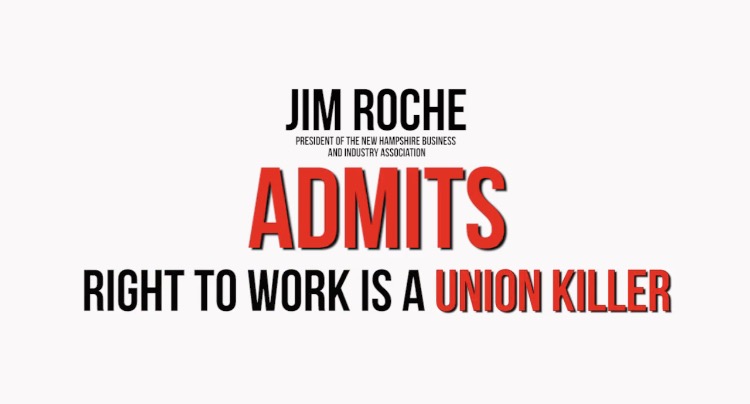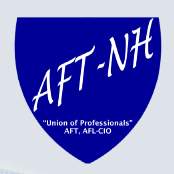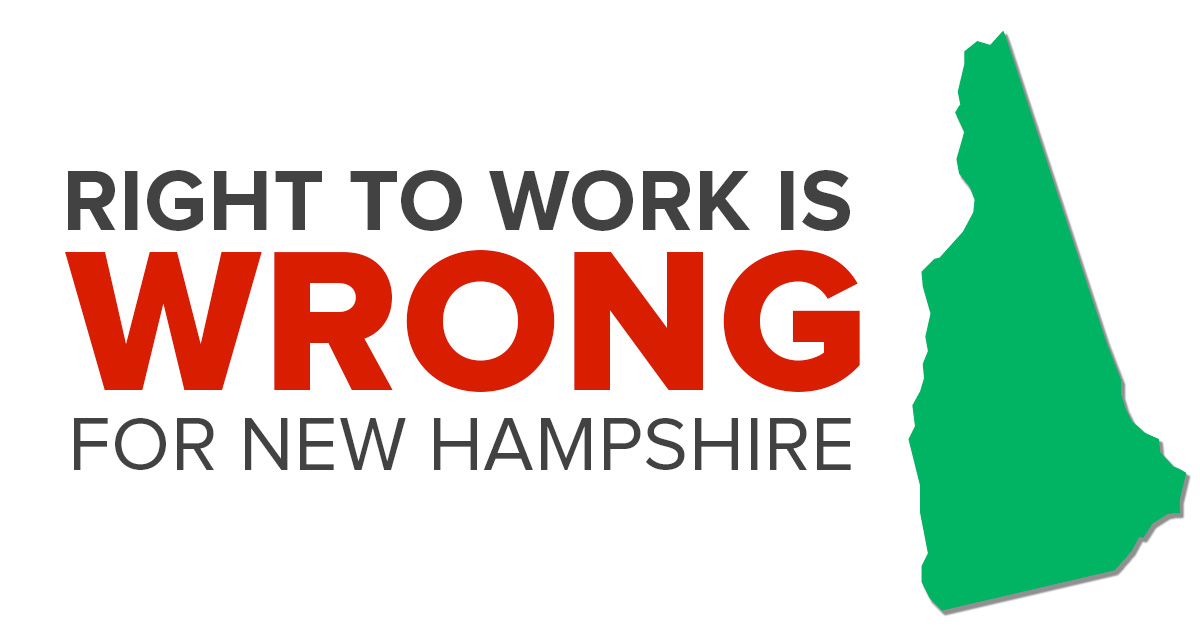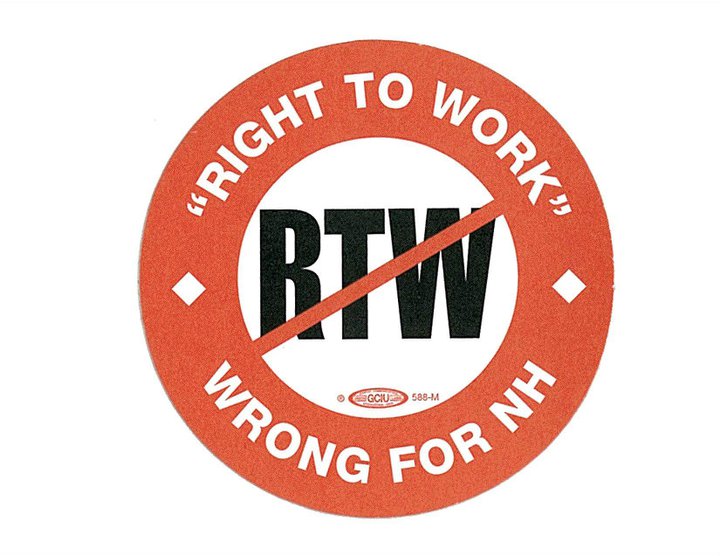
Jim Roche, President of the NH Business and Industry Association admits that so-called “Right-to-Work” is really about destroying unions. Tell you legislator to oppose Right to Work! http://bit.ly/NHrtw

Jim Roche, President of the NH Business and Industry Association admits that so-called “Right-to-Work” is really about destroying unions. Tell you legislator to oppose Right to Work! http://bit.ly/NHrtw
Glenn Brackett, President of the New Hampshire AFL-CIO: “The New Hampshire AFL-CIO was proud to stand with hundreds of working people across the state who are fighting to protect their rights at work. This legislation is an attack on working families by out-of-state special interests seeking to lower wages for everyone and undermine worker protections. The proponents of this legislation are playing politics with the future of our workforce, and New Hampshire working families deserve better.”
Richard Gulla, President of SEA/SEIU Local Union 1984: “So-called right to work has no place in the Granite State, and I’m proud we were able to pack this hall today with those who agree. Both of these bills are tired, recycled legislation that does nothing for the real problems facing our state. We need the House to reject these bills so we can get down to working together on legislation that helps – not hurts – New Hampshire families.”
Sarah Hirsch, President of the University of New Hampshire Lecturers Union: “The families of New Hampshire want the college students to be solidly prepared and ready to enter good careers. To do this, the faculty who teach and mentor them need to be protected, have job stability and security, good benefits, and a say in their working conditions! Weakening unions ultimately weakens higher education, undercutting the development of a skilled workforce for New Hampshire at a time when we need more competitive workers in the state.”
Frank Moroney, Executive Director AFSCME Council 93: “It’s a powerful statement that a majority of legislators, both Democrats and Republicans, voted against so-called “Right to Work” today. They stood together because they know protecting our right to speak up together on the job shouldn’t be a partisan issue. Right to Work would hurt working families across the Granite State, and we’ll continue to fight against this legislation as it moves to the House floor.”
Dennis Caza, President of Teamsters Local Union 633: “Today, hundreds of our brothers and sisters stood in Solidarity to defend the rights of New Hampshire’s workers. We hope that we have sent a message to the legislature that so-called “Right-to-Work” is not the solution that New Hampshire working families need. In the coming days, we urge workers in every industry across the state to contact their legislators and let them know that this so-called “Right-to-Work” legislation is wrong for New Hampshire.”

Senator Lou D’Allesandro has always stood with New Hampshire working families. His words on the Senate floor regarding the Senate Commerce Committee’s decision to immediately vote to pass SB11-FN (so-called “Right-to-Work”) out of committee before reading or researching any of the submitted testimony show that he understands the importance of unions to a prosperous middle class in the Granite State. Sadly a majority of his fellow Senators don’t care about good wages and benefits for the working class and passed the bill 12-11.
The New Hampshire AFL-CIO would like to thank those Senators who voted to defeat the fraudulently-labeled “Right-to-Work” bill in the Senate.
We will need your assistance, voice, and leadership to defeat this in the House of Representatives.
For more information on the fraudulently labeled “Right-to-Work” legislation, CLICK HERE

PRESS RELEASE

Brothers & Sisters,
As we begin the process of swearing in the winners of November’s election, I know that many of us feel discouraged and tired. Members across New England dedicated thousands of hours of their time to advocate for the election of leaders that would stand up for New Hampshire working families. In an election year where the entire country experienced a wave of GOP wins on the state and federal level, New Hampshire once again defied the norm and will be sending an all female Democratic delegation to Washington D.C.
Unfortunately, despite your tireless effort put into our Labor 2016 election campaign, we are faced with a New Hampshire Republican Party control of our legislature and the Governor’s Office. Although many of us are tired from a hard fought and seemingly endless campaign, we must stay active. We must stay engaged. And most of all, we must stay united.
Governor-elect Sununu has already publicly stated (more than once) that Right to Work legislation is at the top of his agenda. Make no mistake, unless we come together and fight, New Hampshire will be a Right to Work state. Despite the misleading name, so-called “Right to Work” laws do not guarantee anyone a job and do not protect workers’ rights. Right to Work laws prohibit trade unions from collecting fees to cover the cost of contract administration from employees who benefit from the protections of a collective bargaining agreement, but do not join the union. There are different versions of Right to Work legislation, but all Right to Work laws are designed to limit the power of labor unions, and the workers they represent, to negotiate for better pay and working conditions. While supporters typically claim that Right to Work laws are necessary to attract new businesses and increase employment opportunities, rigorous economic studies have failed to validate such claims.
The labor community in the Granite State has an obligation to the rest of New Hampshire working families to fight Right to Work legislation using all of the resources and allies we can organize. And we cannot afford to wait until the new legislative session starts and the Governor-elect becomes Governor. We must start to lay the plans for our opposition today!
As Governor, Chris Sununu will not only have the help of a Republican controlled legislature, but also the help of dark money Super PACs such as those funded by the Koch Brothers and other conservative millionaires. Well-funded Right to Work proponents like the National Right to Work Committee, U.S. Chamber of Commerce, American Legislative Exchange Council (ALEC) and Americans for Prosperity will be spending millions of dollars to push an anti-labor agenda.
We all have connections to different allies and a wide variety of resources. The only way that New Hampshire will not become a Right to Work state is if we use our numbers and our voices to stand together, and stand up for New Hampshire working families.
Start talking to your colleagues, fellow members, family members, and friends about what we can do to protect New Hampshire workers and their families from the attacks that are sure to come this legislative session.
The New Hampshire AFL-CIO will stand with its fellow brothers and sisters in the rain, sleet, and snow to protect New Hampshire workers and their future. Let’s get to work!
For more information on Right to Work click here.
For more information on upcoming events regarding organizing our opposition to anti-union attacks, please continue to check our website or email araff@nhaflcio.org

Yesterday New Hampshire AFL-CIO President Glenn Brackett stood with numerous members of the New Hampshire labor community in opposition to HB 1341, a bill relative to employee payments to unions. HB 1341 is another attempt by the anti-union wing of the New Hampshire legislature to undermine the existence of organized labor in the Granite State. Below is an excerpt from President Brackett’s testimony:
“House Bill 1341 would establish a statutory right for all public and private sector workers, who are not union members but are covered by a collective bargaining agreement, to divert payment for the total amount of their union agency fees to a charity, for any personal reason, regardless of the negotiated terms of the agreement.
All New Hampshire employees covered under a collective bargaining contract already have a full legal right to redirect their union fees to charity based on legitimate religious objections. We are forced to conclude, therefore, that the true intent of House Bill 1341 is to weaken the collective voice of New Hampshire workers who benefit from representation by a labor union.”
House Bill 1341 is not a legitimate mechanism for increasing aid to charitable causes. To paraphrase William Shakespeare, so-called “right-to work” legislation called by any other name still smells like “right-to-work.” This bill, if passed, would allow those individuals that choose to have their union fees diverted to charity, to still take full advantage of the protections given by the union and collective bargaining agreement. The members that pay into their labor organization so that they can both protect and be protected in the workplace would be forced to shoulder the cost of those who opt out of the payments. This is not a fair burden to place on working families that already struggle to make ends meet and provide for their loved ones.
As New Hampshire
AFL-CIO President Brackett put it:
“House Bill 1341 offers no meaningful benefits to New Hampshire’s economy, workers or businesses. I urge members of the committee to vote this legislation ‘Inexpedient to Legislate.’”

By Debby Szeredy, Executive Vice President/American Postal Workers Union
Did you know that the United States had a successful Postal Savings System for more than fifty years? From 1911-1967, working Americans could open a savings account at their local post office, guaranteed through the full faith and credit of the United States and earning interest at 2 percent. At its height in 1947, the Savings System had $3.4 billion in assets (more than $35 billion in today’s dollars) or about 10 percent of the entire commercial banking system.
Today, our country is again in great need of affordable financial services. Nearly 28 percent of U.S. households (or 100 million people) do not have access to affordable financial services. A shocking 54 percent of African-American and 47 percent of Latino households are underserved by traditional banks.
For many, traditional banks are out of reach either geographically (bank deserted areas exist in both rural and urban communities), or due to high fees and other obstacles to opening, maintaining and accessing accounts. This lack of access drives millions (mainly the working poor) to rely on costly, predatory services such as check cashing and payday loans, trapping many in a cycle of debt.
Each year, the average underserved household spends $2,412 — nearly 10 percent of gross income — in fees and interest for non-bank financial services. The $100 billion a year Alternative Financial Services (AFS) industry has flooded the communities where the underserved live with products, services and practices that are expensive and often predatory, with typical interest rates of 391 percent!
As United for a Fair Economy puts it, “For the underserved, there is little opportunity to create a credit history, have access to affordable, safe and sustainable financial services, or build assets over time.”
The Postal Service is not in business to make a profit for shareholders. Its purpose is to serve the American people. This is in stark contrast to the predatory practices associated with alternative financial services such as payday lending or the high fees of many traditional banks.
The 2008 financial crisis led to widespread anger at, and plummeting public confidence in, big banks. As a result, the interest in alternatives to traditional banks has increased. Postal banking is a public, non-profit option.
“Banks are rapidly abandoning low-income and rural neighborhoods… Luckily, there is an organization with the public mission, the infrastructure, the experience and the well-trained employees needed to help address this problem: the U.S. Postal Service… The Postal Service already has a presence in low-income and rural communities, and it could leverage that infrastructure to provide access to lower-cost basic banking services,” writes Senator Elizabeth Warren (D-MA).
With more than 30,000 local post offices across the country, the US Postal Service is in a unique position to offer basic financial services. Many of those post offices are located in bank deserted areas. Fifty-nine percent of post offices are in zip codes with either zero banks or only one bank branch. The Postal Service is geographically well-positioned to reach people, whether rural, suburban, or urban, with little-to-no access to retail banking services.
After the financial crisis of 2008, public confidence in banks fell to 26 percent. But Americans consistently rank the U.S. Postal Service highest among all federal agencies with more than 70% of those polled saying it does an excellent or good job. According to a November 2014 Gallup poll, the age group that ranks the USPS highest is 18-29 year-olds, at 81%.
The U.S. Postal Service is already providing some financial services. Its workforce is trained and certified to handle many financial transactions including the sale of money orders, international money transfers, and cashing of treasury checks. USPS window clerks processed 500 million money order transactions over the past five years at a face value of $110 billion. That adds up to 378,000 money orders per day in 2014.
Postal Banking will help struggling families nationwide achieve financial stability and will benefit consumers who would prefer a more public option. And the expansion of services will strengthen our public Postal Service.
The Campaign for Postal Banking is a coalition of labor, consumer, financial reform, faith-based and citizen groups that is calling for low-cost, consumer-driven products and services that could range from check cashing to bill payment to savings accounts to small-dollar loans.
Visit www.campaignforpostalbanking.org to learn more and to add your voice to the call for affordable financial services at the post office!